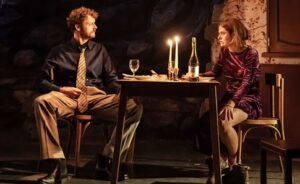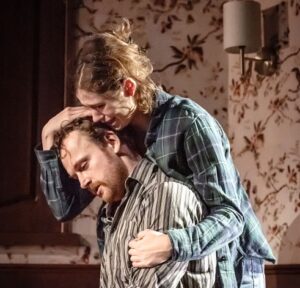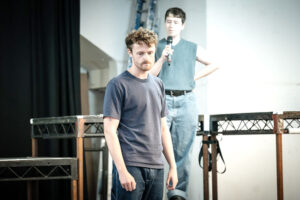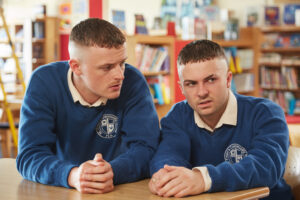Actor Chris Walley spoke to David Hennessy about returning to stage in the Almeida’s Portia Coughlan, winning an Olivier Award for Martin McDonagh’s The Lieutenant of Inishmore and breaking through as Jock in The Young Offenders.

Well known for playing Jock in RTE and BBC’s hit comedy The Young Offenders, Chris Walley is back on the London stage in a star-studded London revival of Marina Carr’s Portia Coughlan.
This is Chris’ first return to the London stage since his Olivier Award-winning turn in The Lieutenant of Inishmore. On the face of it, Portia has a good life that includes a wealthy husband and children. Unfulfilled as a wife and mother, Portia has never achieved her potential. Portia has also never got over a tragedy from her youth that is about to come flooding back in all too vivid a way. When she starts to hear the ghost of her long dead twin brother, things start to unravel.
Conversations with Friends actress Alison Oliver stars as Portia while Sorcha Cusack and Derry Girls star Kathy Keira Clarke are also among the cast directed by Carrie Cracknell.
Chris plays Portia’s husband Raphael. Raphael loves his wife but is still powerless and unable to reach her.
“It’s going really well,” Chris told The Irish World of the rehearsals for the play.
“Challenging work, but very rewarding. I’m just really enjoying it.”
Is it a play you had been familiar with?
“Yeah, it definitely was. It’s almost a legendary play at this point in Ireland. Marina Carr is such an incredible writer. It’s just really quite extraordinary how she manages to portray these people and this small community. Reading other things after, everything seems to just pale in comparison. She has just such an amazing ability to get to the core of humanity and who these people are.

“The play is a young woman, Portia Coughlan and her unravelling. “It’s her 30th birthday and her twin brother died 15 years previously. He has started to kind of appear to her so she’s kind of torn between the living and the dead. It’s about how that is impacting her family as she kind of begins to unravel.
“It’s tragic. It’s also very funny. I just think it’s very human ultimately.
“I play Raphael Coughlan, Portia’s husband. He is a young man in his early 30s. He owns and runs a factory. He has three kids and recently Portia, it appears to him, seems to be having some form of a mental breakdown.
“So there’s a lot on his plate. Trying to manage the home, everything at work and also trying to be there for Portia. He’s under a lot of pressure. I think he doesn’t really understand what’s going on with her. He’s finding it very hard to connect with her and, ultimately, to try save her because he feels like he’s losing her. He doesn’t really recognise the person she’s becoming and it’s quite frightening to him.”
The Irish Independent said of the play back in 1996, ‘Portia Coughlan packs a hell of a punch. It hurts to look at it. But it has to be seen.’
It’s a visceral watch by the sound of it…
“It is. Yeah, it’s an uncomfortable watch but it’s a truthful watch. It’s true of these parts of Ireland. It’s ugly, it’s beautiful and it’s just very raw. It is uncomfortable. I would agree with that quote. I think the same can be said for being in it. A lot of people really put themselves out there for the show, they put themselves on the line. I couldn’t agree more.”
Is it draining for you as actors in that case?
“It can be. But that’s the nature of the job and you have to go home, put on a happy playlist and then go for a pint with your mates.”
Speaking of going for a pint, alcohol plays a big part in Portia’s story, doesn’t it?
“Yeah, as her brother is starting to reappear and she can hear him, she kind of combats that with alcohol which I think is very true of a lot of people that suffer with mental health. They just try and block it out. And that comes into family life and it makes it more difficult for Raphael to try and connect to her when she is intoxicated. It’s very interesting to note in the play when she is under the influence of alcohol or when she isn’t, and when she is hearing Gabriel and when she isn’t.”

That’s part of the ‘mystery’, isn’t it? I believe Marina has described it herself as something of a mystery..
“It’s an Irish folklore mystery and the same argument could be had with anyone in a pub or any part of Ireland. Everyone has stories of banshees, stories of ghosts, and I suppose you take what you want from that. Is Gabriel really there? Or is Portia hearing him? Is she somehow connected to the other world or is it all in her head? You’ll have to come and see and make up your own mind.”
It’s tragic. It’s also very funny. I just think it’s very human ultimately.
Another theme is grief and actually in common with Tarrac, another feature we have this week, how grief can be buried for so long before it reawakens.
“Absolutely, and I think it’s the nature of Ireland and the nature of a lot of rural Irish communities. Grief often isn’t spoken about, and it’s not handled in the healthiest of ways so it becomes buried, and it becomes out of sight, out of mind: Let’s just get on with it. And if you don’t grieve and you don’t acknowledge that grief, it festers inside you and it bubbles up in all sorts of different ways, be it mental health, anger or alcoholism. I think that’s unfortunately very truthful of Ireland.”
The part is very different from anything you have played before, isn’t it? It’s certainly a long a way from Jock..
“Yeah, absolutely. It is. It certainly is a long way from Jock. It’s very different than anything I’ve done before. You try to do different things as often as you can and not play the same part twice. But yeah, it’s a challenge I welcome. You just want to be challenged in this, there are certain parts and certain jobs that are well within your wheelhouse.

“They can always be different, but there can be stuff you can access very easily and then there’s stuff you need to be stretched for. There are certain parts of Raphael that are very similar to me and certain parts that are very different and finding those parents that are different is what the five weeks rehearsal and what the run is all about. That’s why I act. That’s what I love about it, so I welcome it and I’m excited for it.”
How would you say you are like Raphael and how are you not like him?
“He tries to be kind and he tries to do well by people and I think he’s misunderstood in that capacity, all he’s trying to do is do his bit. I can connect with that. But then there are other parts of him. He can let himself be walked all over, which is something that I would struggle to connect with.
“But you understand what he’s going through and that’s essentially what it all comes down to, you just need to understand who this person is. If you don’t understand who they are, you can’t play them. So it’s constantly digging to try and understand why they do and why they say what they say and who this person is. When you know who the person is, you can play them.”
What has it been like to see Alison take on Portia’s troubled character?
“It’s truly just incredible watching her every day, day by day, become more and more of Portia. To see her develop, I’m kind of in awe of her.
“It’s truly remarkable. She’s a real, real talent and when you’re acting with someone of that calibre, it makes your job very easy because when you’re with someone that’s that in it and that talented, it makes it a lot easier for you to forget and to just throw yourself into the world.
“To be honest, the whole room, the rehearsal room, there’s just so much talent in the room in terms of all of the cast and everyone kind of really feels like you’ve got to be on your A game because everyone’s bringing it but like I said, that makes it also so much easier to do that because their talent just makes the world so much more believable.
“You forget you’re looking at an actor and you feel like you’re looking at Portia Coughlan or whoever the other character may be.”
Have you had a ‘pinch me’ moment of looking around and seeing people like Sorcha Cusack and Kathy Keira Clarke among the cast?
“Oh, absolutely. When I saw who was going to be in it, I was thrilled. I was so excited to be working with these people, people I’ve looked up to my whole life and now I get to share the stage with them.
“But then quickly, when you get into the room, when we sit down and we start going through the script, it just becomes about the work and we’re all kind of on an even playing field then and we’re all just there to work. I’m learning stuff every day from watching all these incredible actors. Constantly learning and just real privilege to be in that room.”
You have had some incredible moments so far in your career. Has there been a particular ‘pinch me’ moment? Such as being in a film with Alec Baldwin (Pixie) or when Roy Keane guested in The Young Offenders?
“I think I often don’t feel that in the moment, it’s kind of looking back on things. But yeah, there’s been many of them.
 “I mean, the Olivier, I suppose was kind of a bit of a whirlwind. But again, at the time, it was like, ‘Oh, cool, great’. And then a week later, you look at it, and you’re like, ‘That’s mad’. But at the time, you’re just enjoying it and you’re just taking everything as it comes and trying to just stay true to the work but very grateful for everything always.”
“I mean, the Olivier, I suppose was kind of a bit of a whirlwind. But again, at the time, it was like, ‘Oh, cool, great’. And then a week later, you look at it, and you’re like, ‘That’s mad’. But at the time, you’re just enjoying it and you’re just taking everything as it comes and trying to just stay true to the work but very grateful for everything always.”
Chris won the Olivier Award for best supporting actor in 2018 for his portrayal of Davey in the West End revival of Martin McDonagh’s The Lieutenant of Inishmore.
Do you see similarities between Carr and McDonagh as playwrights?
“Erm.. yes, and no. I’d say ultimately, they’re very different writers. Ultimately both fantastic playwrights, but quite inherently different.
“They do handle darkness at some times in similar capacity and then sometimes in total opposite ways, they both combat darkness with humour at times. But I think that’s the mark of any great writer because that’s just what humanity is. But I’d say ultimately they’re very different writers but both extraordinary talented.”
When did you know that you wanted to be an actor?
“I knew very young it was for me. I kind of went through the phase of wanting to be a soccer player and play for United and then realised I wasn’t going to get scouted. I remember seeing films and asking could I join drama.
“That was probably when I was like seven and then ever since that I kind of knew that was what I wanted. I think I was lucky that way, I always knew. And I think my parents always knew as well, I told them since I was that age, and I never grew out of telling them. I was like, ‘No, I still want to do that. Yeah’. It was my biggest passion and still is.”
A lot of people know you as Jock from The Young Offenders.
First a hit as a feature length movie, RTE and BBC have aired three series of Jock and Conor’s adventures.
When did you know you had something special on your hands with the Cork-based adolescent comedy?
“Reading the script, it felt like it was something great but it also had no budget. I was quite realistic with myself at that point. I knew what they hoped would happen with it but I was also very aware that it’s very difficult to get a film made, let alone for it to be a big success.
“I think it was only maybe about halfway through filming, when we were seeing bits and pieces and seeing how we were all getting on and the connection I had with Alex (Murphy, who plays Conor).
“Then I started to go, ‘Oh, maybe this is something special…’ But initially when I got cast, I was just doing it for the love of it. It didn’t feel like I was doing it as it was gonna be a hit, it never felt that way. And then when it was, it actually came as a surprise to me how successful it was.
 “When I saw the film, I was very proud of it but it’s hard to ever know if something’s going to be a success or not. And then obviously, when we did the TV series, it was a different thing because it obviously had the film behind it.”
“When I saw the film, I was very proud of it but it’s hard to ever know if something’s going to be a success or not. And then obviously, when we did the TV series, it was a different thing because it obviously had the film behind it.”
Any plans for further series?
“There is, there’s another season coming out. We just finished filming earlier this year. It’ll be back.”
What would Jock say about you starring in a West End play?
“He wouldn’t know what to make of it at all. I don’t think he’d be going anyway. You wouldn’t get him into the theatre.”
Portia Coughlan comprises cast members from The Young Offenders, Derry Girls and Conversations with Friends.
Does it feel like an exciting time for the Irish film and TV industry?
“Yeah, absolutely. You know, it’s incredible that Irish television and film used to always feel very insular and it felt like we made stuff for ourselves. I still think that there’s a thing attached that when you’re making something Irish I can still feel, ‘Oh yeah, but no one will see this…’ which isn’t the case.
“And it’s something I think I have to get past and everyone has to get past because clearly it isn’t the case with the success of Normal People and Conversations with Friends and Derry Girls, it transcends and I think with Portia coming over to London, the same will be happening now with theatre.
“Dancing at Lughnasa was just in the National with Alison and that was incredible. Clearly these are shows that people want to see and they’re stories that needs to be told. I think it’s incredibly exciting for the arts in general be it music, theatre, film. It’s a very exciting time in Ireland to be an artist.”


